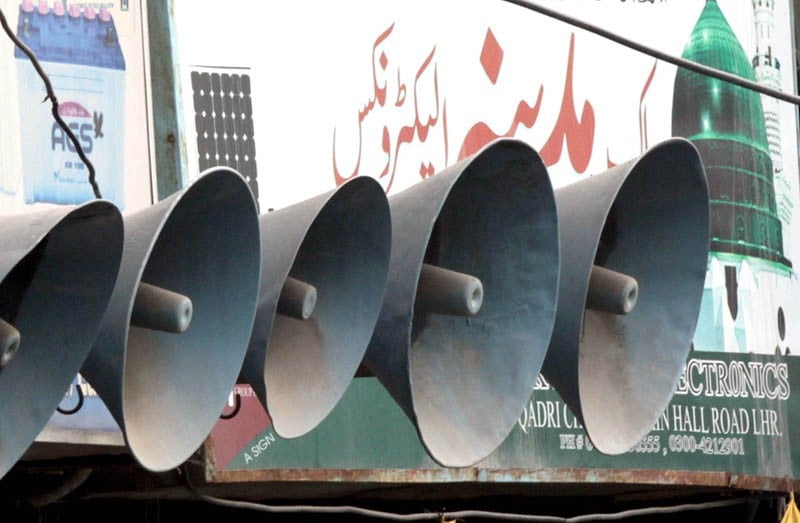
A loudspeaker is the most unregulated instrument and clerics have monopoly over this very important propaganda tool

Farooq Ahmad, a hafiz-e-Quran and a physician in traditional medicine, was accused of desecrating the holy Quran by his neighbours in Gujranwala in 1995.
As the news reached more people, a madrassa student made an announcement on a loudspeaker from a mosque in the neighbourhood, saying an ataee (quack) had desecrated the holy Quran. The people, reportedly, mistook the word for esaee (Christian) and were provoked so much that they beat Ahmad to death. They tied his body to a motorbike, dragged him on roads, and finally set his body on fire.
A senior police official tells TNS that loudspeaker plays the most important role in turning a situation out of control in blasphemy and sectarian issues. "The Rawalpindi tragedy on Muharram 10 last year was also a result of misuse of loudspeaker. The prayer leader reportedly used indecent words about the rival sect on a loudspeaker which resulted in clashes in which at least six people died."
The official says an amplifier empowers those who use hate speech as a weapon. "A loudspeaker at a mosque is the most unregulated instrument and clerics have monopoly over this very important propaganda tool."
He says the misuse of loudspeakers has not only increased the influence of clergy in Pakistani society but has also played a big role in radicalising the society through hate speech. "A loudspeaker, over the years, has become a tool to spread hatred against minorities and rival sects."
Hate speech is one of the biggest threats to Pakistan’s diverse culture and, more significantly, it is broadcast from loudspeakers of the mosque. "Use of loudspeaker is one of the main reasons of increasing intolerance in our society," says Maulana Tahir Ashrafi, head of Pakistan Ulema Council.
"There is a link between rise in sectarian violence and use of loudspeakers in Pakistan," believes Ashrafi, adding that his organisation has long been demanding a complete ban on use of loudspeaker. "I am not saying that there was no sectarian issue before the invention of loudspeaker but in the last four decades or so, after loudspeaker became an integral part of religious gatherings and rituals, the issue has increased manifold."
Ashrafi agrees that misuse of loudspeaker has played a major role in fanning violence, especially in blasphemy cases in the last two decades or so. "Whether it was Gojra or Kot Radha Kishan, the issue turned violent only after local maulvis delivered hate speech from local mosques, forcing the local population to react in a violent manner," he says.
Naveeda Khan, Associate Professor at the Department of Anthropology at John Hopkins University, wrote in her paper, The Acoustics of Muslim Striving: Loudspeaker Use in Ritual Practice in Pakistan. "Many elderly people with whom I spoke about the changes they had experienced in the sound-scape of Lahore mentioned that they first became aware of differences amongst Muslims once the azan began to be delivered over loudspeakers."
Broadcasting of hate speech is not because of this technology. The main issue is the thought process that encourages sectarianism and hate speech. "The use of technology has increased the reach. It is also true that a loudspeaker has become one of the main platforms to spread hatred. But there is no homogeneity in the usage. There are many people who have been using it to counter the hate speech," says Dr Husnul Amin, an expert on political Islam who teaches at International Islamic University, Islamabad. "A loudspeaker, itself, is not a problem. In tribal societies like ours it becomes a social compulsion to react to such situations."
The advent of new technologies like tv, internet, and mobile phones have reduced the role of loudspeaker in spreading hate speech in urban centres, but in rural areas, it still remains the most significant tool for spreading hate speech. "There are several means of spreading hate speech available to clergy today but loudspeaker still remains one of the most important one, especially in rural areas where people belonging to different sects live side by side," says Amir Rana, head of Pak Institute of Peace Studies, a think tank.
"It is also true that people in urban centres and rural areas react differently to hate speech being broadcast from a loudspeaker. But when a mullah says that ‘Islam is under threat,’ the reaction in most cases is abrupt. A loudspeaker also helps build mob psyche."
Rana believes the government can control the use of loudspeaker. "In Punjab, during his tenure as chief minister, Manzoor Wattoo successfully controlled the misuse of loudspeaker and limited its use only to Azan."
Shaukat Javed, former Inspector General of Police, Punjab says, "In my career as a police official, I have seen misuse of loudspeaker playing a big role in sectarian and minority-related violence," he says, adding that police alone can do nothing to stop its misuse. "We need a strong political will. People who make announcements on loudspeakers related to blasphemy issues should be punished. Loudspeaker should be used only to broadcast within the premises of mosques and imambarghas. This is doable and will solve almost half of the problems related to sectarianism in the country."